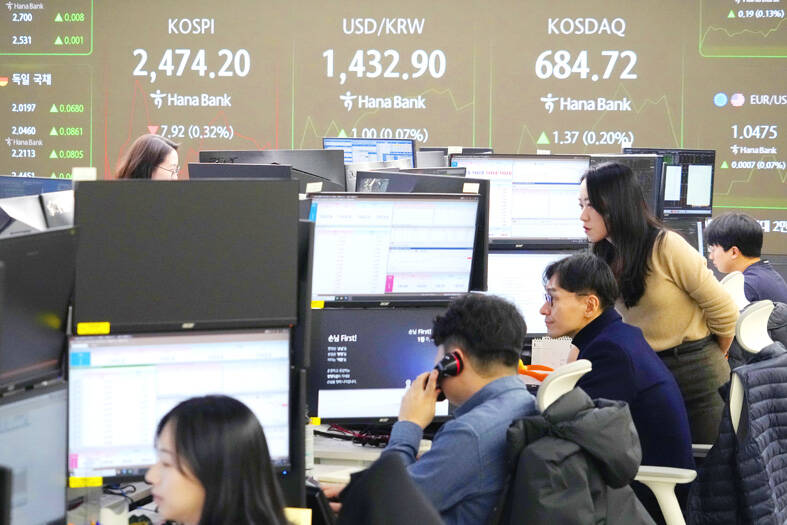South Korea’s central bank vowed to stabilize financial markets and highlighted the importance of “uninterrupted implementation” of key fiscal and economic measures, in its first statement since lawmakers voted to impeach South Korean President Yoon Suk-yeol.
“The Bank of Korea [BOK] intends to utilize all available policy instruments, in conjunction with the government, to respond to and avert an escalation of volatility in financial and foreign exchange markets,” the central bank said yesterday, addressing the fallout of Yoon’s failed martial law decree earlier this month.
Comparing the current situation with the impeachment phases of past presidents, the BOK said the latest case is “characterized by greater external challenges, such as heightened uncertainty in the trading environment and intensified global competition.”

Photo: AP
“Should these external factors overlap with domestic ones, their impact may amplify,” the BOK said, calling for an interventionist approach to righting the economy.
In the days after Yoon’s martial law declaration, the stock market plunged and the South Korean won at one point tumbled against the US dollar to the worst level since the global financial crisis erupted in 2008.
The central bank’s message comes after South Korea’s parliament on Saturday voted to oust Yoon from office, a decision that must now be reviewed by the Constitutional Court.
After the ballot, South Korean Prime Minister Han Duck-soo, who serves as acting president, asked his advisers to step up their monitoring of financial markets, calling for “swift and bold” stabilizing steps if needed.
“Predictability of the political process is expected to improve going forward and financial market volatility is anticipated to reduce” following the impeachment vote, the central bank said in its statement.
South Korea’s main opposition leader Lee Jae-myung also underscored the importance of restoring normality. Lee proposed creating a bipartisan body involving parliament and the executive branch to discuss ways to stabilize the state and boost a flagging domestic economy.
“What we need to discuss right now is slumping domestic demand and the slowdown in the economy due to the shrinking fiscal role of the government,” Lee said at a news conference yesterday. “In order to solve this problem, I think we need to discuss the supplementary budget swiftly.”
The Constitutional Court has 180 days to rule on the validity of the impeachment motion passed on Saturday. If the court moves forward with removing Yoon, presidential elections must be held within 60 days.

POWERING UP: PSUs for AI servers made up about 50% of Delta’s total server PSU revenue during the first three quarters of last year, the company said Power supply and electronic components maker Delta Electronics Inc (台達電) reported record-high revenue of NT$161.61 billion (US$5.11 billion) for last quarter and said it remains positive about this quarter. Last quarter’s figure was up 7.6 percent from the previous quarter and 41.51 percent higher than a year earlier, and largely in line with Yuanta Securities Investment Consulting Co’s (元大投顧) forecast of NT$160 billion. Delta’s annual revenue last year rose 31.76 percent year-on-year to NT$554.89 billion, also a record high for the company. Its strong performance reflected continued demand for high-performance power solutions and advanced liquid-cooling products used in artificial intelligence (AI) data centers,

SIZE MATTERS: TSMC started phasing out 8-inch wafer production last year, while Samsung is more aggressively retiring 8-inch capacity, TrendForce said Chipmakers are expected to raise prices of 8-inch wafers by up to 20 percent this year on concern over supply constraints as major contract chipmakers Taiwan Semiconductor Manufacturing Co (TSMC, 台積電) and Samsung Electronics Co gradually retire less advanced wafer capacity, TrendForce Corp (集邦科技) said yesterday. It is the first significant across-the-board price hike since a global semiconductor correction in 2023, the Taipei-based market researcher said in a report. Global 8-inch wafer capacity slid 0.3 percent year-on-year last year, although 8-inch wafer prices still hovered at relatively stable levels throughout the year, TrendForce said. The downward trend is expected to continue this year,

Vincent Wei led fellow Singaporean farmers around an empty Malaysian plot, laying out plans for a greenhouse and rows of leafy vegetables. What he pitched was not just space for crops, but a lifeline for growers struggling to make ends meet in a city-state with high prices and little vacant land. The future agriculture hub is part of a joint special economic zone launched last year by the two neighbors, expected to cost US$123 million and produce 10,000 tonnes of fresh produce annually. It is attracting Singaporean farmers with promises of cheaper land, labor and energy just over the border.

A proposed billionaires’ tax in California has ignited a political uproar in Silicon Valley, with tech titans threatening to leave the state while California Governor Gavin Newsom of the Democratic Party maneuvers to defeat a levy that he fears would lead to an exodus of wealth. A technology mecca, California has more billionaires than any other US state — a few hundred, by some estimates. About half its personal income tax revenue, a financial backbone in the nearly US$350 billion budget, comes from the top 1 percent of earners. A large healthcare union is attempting to place a proposal before